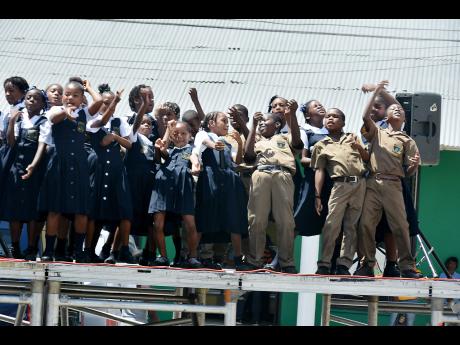Devon Dick | Every child must be in school
'Every child must be in school' should be the philosophy informing the debate about why we go to high school. This assertion that every child should be in school is a response to a reasonable article by Peter John Gordon, 'Why we attend high school' (Oct 5). Gordon argued that some students 'would have done better had they had a more stimulating academic environment. Their dreams were sacrificed in order to facilitate underachievers'. He placed 'keeping underachievers' in opposition to 'blighting the life prospects of others'. It is either or for him.
A child is a human being who is 18 years and under. Every child has a right to benefit from secondary education. No child should be excluded or expelled from school at any age because he or she has failed to meet an academic standard. A child should not be sent away from an educational institution to idle on the streets or to loaf at home or having the possibility of not finding a school. The place for all children is school in order for them to develop to the best of their abilities, their academic knowledge and life skills in a holistic manner. This means that some children might have to repeat a form or given individual attention or extra lessons, or placed in a special class or transferred to another school but never excluded from the secondary school system. Every child can learn and no child should be denied secondary education.
Because someone does not get a 60 per cent average does not mean that he or she is an 'underachiever'. That child could be doing very well in most subjects and very poorly in two or three subjects and the average falls below 60 per cent. I was a mathematics teacher for two years at Morant Bay High School (1979-81) and a form teacher for one of those years. I opposed streaming and prevailed upon the then principal, Stanlie Parkins. In addition, Parkins told me that the performance of my first form class was the best in the history of the school in terms of the average. And how did I do it? After the first term exam, I met with every student and we established a target for the end of year exam and how to accomplish those goals. Everybody improved. The point is, to label students as underachievers is to ignore other factors that will possibly affect learning. These may include class size, need for individual attention, teacher absenteeism, poor teaching techniques, poor family support, slow learning ability, late bloomers and violent community. For these reasons, no child should be sent out of school. By the way, it is reported in some circles that the PEP mock exam average was 46 per cent. Who are we going to blame? The 'underachievers'?
STIMULATING ENVIRONS
Teachers and the leadership of school must realise that adding value to students ought to be a priority. 'Underachievers' need a stimulating environment too. Many years ago, Dr Minott, et al, claimed that Meadowbrook was the top high school in Jamaica based on the value added factor rather than just performance in the external Caribbean examinations. There is much merit in judging a school in such a manner.
We should aim for the inclusion of that value-added factor in the education system. Every child, having gone through this system, must leave a better person. So having meaningful interventions such as consultations with students and parents and even allowing for one repeat of form may be necessary in adding value, and having had the need for such interventions is not reason enough for a child to be excluded from the secondary school system.
- Rev Devon Dick is pastor of the Boulevard Baptist Church in St Andrew. He is author of 'The Cross and the Machete', and 'Rebellion to Riot'. Send feedback to columns@ gleanerjm.com.

